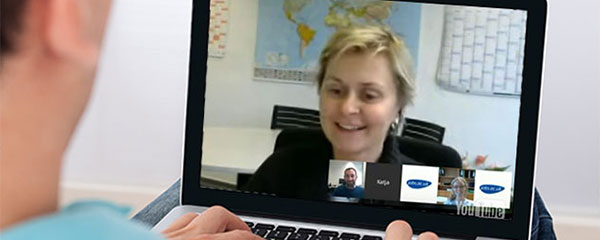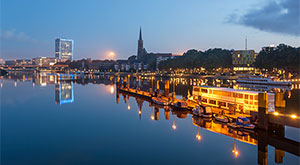Postdoctoral & Research Opportunities in Germany - Google+ Hangout on Air Summary
We recently hosted a live Google+ Hangout on Air with four inspirational panellists with one simple objective: to inform you of Postdoctoral & Research Opportunities in Germany.
The panel included Dr. Katja Lasch, the head of section International Research Marketing at the German Academic Exchange Services (DAAD). Belinda Platt who holds a PhD from the University of Oxford in Experimental Psychology and is now working as a Postdoctoral Researcher at the LMU University Hospital in Munich. Simon Scerri, whose career has taken him from Malta to Ireland and now to Germany as a Senior Postdoctoral Research Fellow at Fraunhofer IAIS and the University of Bonn. Last but not least was Anna Boehme, whose work focuses on research training groups & research careers as the programme officer at the German Research Foundation (DFG).
We were delighted with the number of questions the panel received and wanted to sum up the key topics and main areas of discussion in this article. You can also watch the full event recording here.
Background Information
Germany has a diverse research landscape with over 1000 publicly funded research conducting institutions, however the career paths are not always clear to individuals seeking opportunities. Germany is one of the few European countries achieving its annual research investment target, 3% of GDP or approximately €80 billion. The research network is strong with over 600,000 people in research positions across the country. Germany provides excellent opportunities for international Postdoctoral researchers, which is only strengthened by the strong availability of funding.
What are the language requirements?
It all depends on how much you as an individual want to get from the experience and where you envisage your career heading. Belinda knows of individuals who have moved to Germany without learning the language and have managed to progress. However in Belinda’s field she would not be able to progress without learning German due to her work with German children and adolescents.
Simon who isn’t fluent in German suggests that learning German can definitely improve your opportunities to work with local industries and improve your working life as you may need it within your research group. Being able to communicate in German can also be beneficial for your social life, which is often separate to that of your working life. It is not a requirement to be fluent in German and it is possible in some circumstances to not learn German, however learning the language can increase the number of opportunities open to you.
Although you may not be fluent in German, highlight any other language skills you may have. Particularly English as it can be extremely useful when creating or proof-reading international publications.
What are the funding opportunities?
There are many funding opportunities for researchers in Germany. However Belinda points out that it is important to plan for the finance gaps between grants, she is fortunate as her organisation can provide financial support. If you are to work for a public organisation your pay will be predetermined and there will be little room for negotiation as the salary scales are published online. The German Research Council are currently funding nearly €2 billion a year into research opportunities, normally these funding schemes are open for applicants from all over the world. Please view the funding links at the bottom of this page for more information.
How should you approach your Host Institution?
Belinda suggests not just waiting until a position is advertised, whilst applying to advertised positions is still recommend, you should reinforce your search by contacting senior researchers who may be interested in what you have to offer. You should be prepared to contact a larger number of host institutions and to expect to only hear back from a few. You may be able to increase your chances of hearing back if you can formulate an application in German.
Simons experience on the other hand was very different, he was already working for a European project in Ireland which gave him the opportunity to network and attend many conferences. Katja reinforces this point and suggests networking is essential. You can network even when you’re not in Germany, as many researchers attend international conferences, providing you an access point to key individuals and the possibility of referrals. Katja also states that you should send very precise messages to people you may want to work with and explain why their work is interesting and what you can specifically do to contribute to the research group.
What Makes a Good Application?
Simon suggests focusing on your background, you need to show how your skills and experiences align with the research groups. Particularly highlight any international experiences you may have, and you will need some publications at an international level as they provide credibility. Also make it clear if you can speak German or not, and if not, that you are willing to learn.
Belinda suggests that the German research culture values individuals who can work independently and generate ideas and really know where they want to go with their ideas. If you can highlight these values in your application alongside selling your skills specifically to the research group it will really help you in standing out.
What is it like moving to Germany?
Your experience will vary depending on region and city, our panel agree that on the whole individuals are friendly and great to work with. Belinda and Simon have experienced that work life and private life are kept very much separate, they found this separation quite difficult at first. This doesn’t mean that people are unfriendly, it is just more of a cultural norm to not mix the two. Germans are very welcoming and accommodating of non-German individuals, although it may take time to develop relationships as people can be less open than in other European countries. It is important not to mistake shyness for someone not being interested, relationships just take slightly longer to build in Germany.
There is a host of information and support available from most institutions, there will normally be a welcome centre for new researchers and if not your fellow colleagues will be able to assist you with formal administration and bureaucratic procedures.
Career Paths
The outlook for researchers in Germany is positive, with varying opportunities to suit different needs. There is the opportunity and funding possibilities for individuals who wish to set up their own research groups as junior research group leaders, normally 2-4 years after completing your PhD. For those individuals who are looking for their second or third postdoctoral opportunity, it is useful to know that there is currently a large political discussion occurring around permanent positions and sustainable careers for young people. As the routes to professorship can vary greatly, Germany is investing a lot more in Tenure track positions to keep people in the system and provide them with greater prospects.
On the whole Germany has an array of opportunities and is actively searching international candidates to carry out research within their institutions. You can find out more about opportunities in Germany by clicking the links below.
Research in industry:
www.research-in-germany.org/junior-industry
Career options Postdocs:
www.research-in-germany.org/postdoc-career
Funding databases/Funding Organisations:
www.research-in-germany.org/funding-databases
www.avh.de (Alexander von Humboldt Foundation)
www.dfg.de (German Research Council)
www.daad.de (German Academic Exchange Service)
Funding programmes:
www.research-in-germany.org/funding-programmes
Find a job:
www.jobs.ac.uk
Find a host institution;
www.resesearch-explorer.de
http://www.kowi.de/en/kowi/services/msca-host-offers.aspx (Marie Curie Host Institutions offers)
Language Skills:
https://www.research-in-germany.org/en/plan-your-stay/living-in-Germany/language.html
Living in Germany:
https://www.research-in-germany.org/en/plan-your-stay/living-in-Germany.html
http://www.make-it-in-germany.com/
Facts and Figures:
www.research-in-germany.org/facts-figures
Max Saved Jobs Reached
A maximum of 500 Saved Jobs can be created against your account. Please remove an existing Saved Job in order to add a new Saved Job.
Manage Saved Jobs








